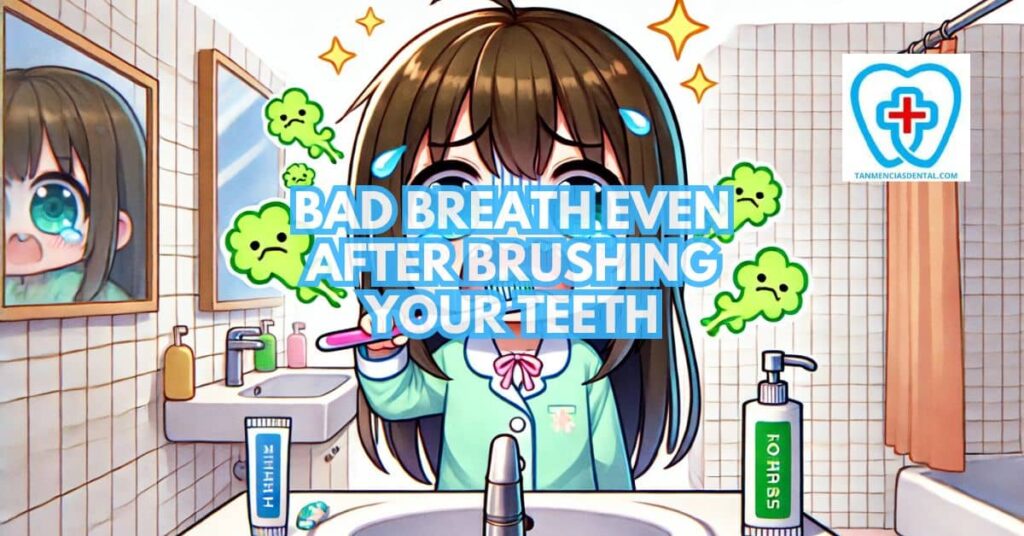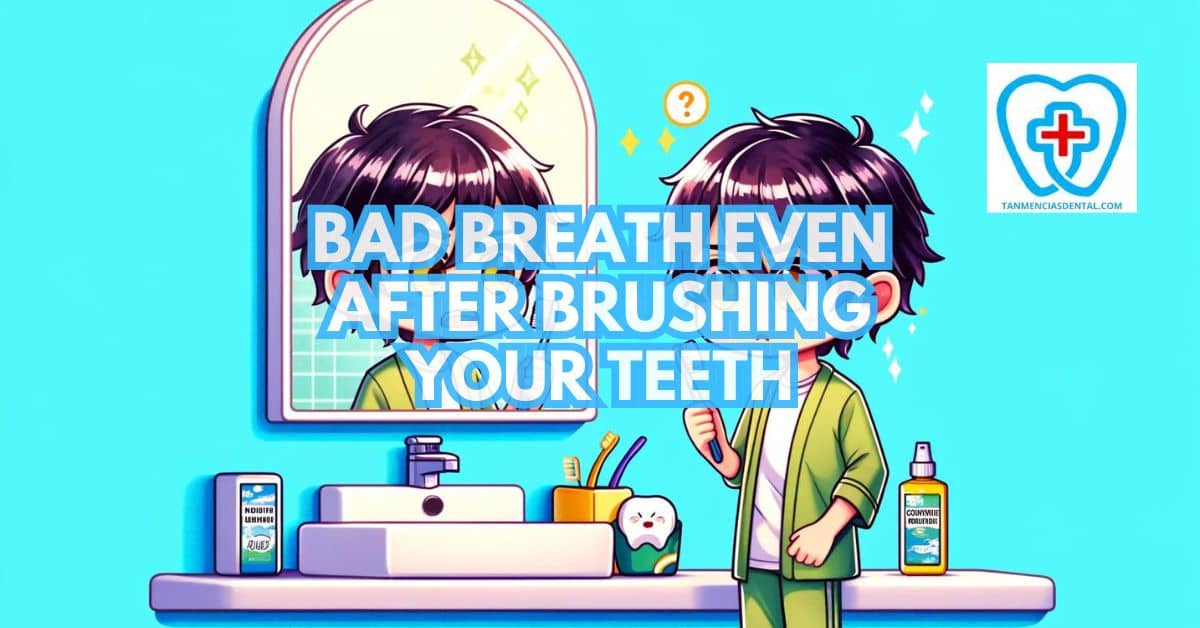Bad breath even after brushing your teeth can be frustrating and embarrassing.
While brushing is essential for oral hygiene, it may not always solve the problem.
Several factors, like diet, certain health issues, and improper dental care, can contribute to lingering bad breath.
Understanding these causes is key to tackling the issue and restoring your fresh breath.
We’ll explore why bad breath persists and provide tips on how to manage it effectively.
1. Beyond the Brush: Brushing May Not Conquer Persistent Bad Breath
Brushing your teeth twice a day is important, but it may not fully solve the problem of bad breath, also known as halitosis.
Bacteria can easily hide in hard-to-reach areas, like between your teeth and along the gumline, where your toothbrush may not be effective.
This buildup of bacteria can lead to persistent odor, which may explain why my mouth smells bad even after brushing.
To tackle this, it’s crucial to incorporate flossing and use an antibacterial mouthwash to clean these tricky spots.
If you wear braces or dental appliances, cleaning becomes even more challenging, so using tools like interdental brushes is necessary for keeping your teeth and gums healthy.
Halitosis can also result from issues beyond oral hygiene, like certain foods, dry mouth, or medical conditions.
Addressing these factors is key to finding a lasting solution to bad breath.
🦷 Should You Rinse with Mouthwash Before or After Brushing Your Teeth?
2. Dental Detectives: Cavities and Gum Disease Can Harbor Odor
Cavities and gum disease are common culprits behind bad breath, even if you brush regularly.
What causes bad breath even after brushing is often linked to bacteria in your mouth that thrive in areas where a toothbrush can’t easily reach, such as cavities or below the gumline.
These bacteria break down food particles, producing sulfur compounds that lead to unpleasant odors.
Tooth decay, if left untreated, can worsen and allow even more bacteria to accumulate, contributing to bad breath.
Regular dental checkups are essential for catching cavities and gum disease early, before they become more serious and lead to chronic odor.
Advanced cases, like periodontitis, can cause severe and persistent bad breath that may require professional treatment.
By keeping up with routine dental cleanings, you can reduce the risk of tooth decay and gum disease, helping to maintain fresher breath.
🦷 How Do Holistic Dentists Address Cavities? Exploring Natural Remedies
3. Tonsil Stones: A Hidden Reason for Bad Breath
Tonsil stones are often a hidden cause of bad breath even after brushing teeth.
These small, hard lumps form in the crevices of your tonsils, trapping food particles, bacteria, and dead cells, which can produce a foul odor similar to garlic breath.
In addition to bad breath, people with tonsil stones may experience discomfort, such as a sore throat or difficulty swallowing.
Sometimes, you can even see white or yellow spots on your tonsils, indicating the presence of these stones.
While brushing regularly can help with overall oral hygiene, gargling with saltwater or using a water flosser may reduce the risk of tonsil stones developing.
If tonsil stones are frequent or causing significant discomfort, they may point to an underlying health condition, such as chronic inflammation of the tonsils.
In some cases, consulting a doctor for treatment options might be necessary to fully address the issue.
🦷 Essential Preventive Measures for Treating Baby Gingivitis: A Guide for Parents
4. Dry Mouth Mayhem: How Lack of Saliva Leads to Bad Breath
Dry mouth, or a lack of saliva, can significantly contribute to bad breath after brushing teeth, even if you practice good oral hygiene.
Saliva plays a crucial role in maintaining oral health by washing away food particles and neutralizing acids produced by bacteria.
When saliva production decreases—often during sleep, from medication, or due to certain health conditions—bacteria in the mouth multiply, leading to unpleasant odors.
Also to brushing and flossing, chewing sugar-free gum or sucking on sugar-free candies can help stimulate saliva flow and reduce bad breath.
If dry mouth becomes a chronic issue, using over-the-counter saliva substitutes or consulting a healthcare provider for specialized treatment may be necessary.
Avoiding habits that can worsen dry mouth, such as smoking or excessive alcohol consumption, can also improve the situation.
Proper hydration is another essential part of managing dry mouth and ensuring good oral hygiene.
🦷 Does Tooth Brushing Actually Whiten Your Teeth? Uncovering the Facts About Your Smile

5. Tongue Trouble: Don’t Forget to Clean Your Tongue for Freshness
The tongue is often overlooked in oral hygiene routines, but it can be a major source of bad breath.
Its rough surface can trap food particles and bacteria, which can explain what can cause bad breath even after brushing.
Cleaning your tongue twice daily, either by using a tongue scraper or brushing it with your toothbrush, helps remove this buildup and get rid of bad breath more effectively.
Adding this simple step to your oral care routine can lead to noticeably fresher breath.
It’s especially useful after eating strong-flavored foods, like garlic or onions, which can leave lingering odors.
Additionally, a clean tongue promotes overall good oral hygiene and can prevent bacteria from spreading to your teeth and gums.
This extra care ensures that your mouth feels and smells fresh throughout the day.
🦷 What Causes Broken Tooth Pain in the Jaw? Understanding the Symptoms and Remedies
6. Food for Thought: Certain Foods Can Impact Your Breath
What you eat can have a direct effect on how your breath smells.
Foods like onions, garlic, and certain spices contain volatile substances that enter your bloodstream and then your lungs, affecting your breath until they are completely metabolized.
Dairy products can also cause bad breath because oral bacteria can decompose leftovers in your mouth, giving off an unpleasant smell.
To minimize the impact, consider using mouthwash or chewing sugar-free gum after eating strong-smelling foods.
It’s also beneficial to maintain a balanced diet rich in fruits, vegetables, and water to naturally help cleanse your palate.
🦷 Is Saltwater Effective for Treating Gum Disease? Understanding Its Benefits and Risks
7. Sinus Surprise: Sinus Issues and Postnasal Drip Can Cause Bad Breath
Sinus infections and allergies can lead to postnasal drip, where excess mucus accumulates in the back of your throat, creating an ideal environment for bacteria to grow.
This condition often produces a distinct odor, particularly noticeable in the morning.
Treating the underlying sinus condition with medication or natural remedies can reduce or eliminate this type of bad breath.
It’s also helpful to stay hydrated to thin the mucus and promote drainage.
If sinus problems are a recurring issue, consulting with an ENT specialist may be beneficial.
🦷 Hidden Foods That Contribute to Gingivitis: What You Should Watch Out For
8. Smoking Stinks: The Negative Impact of Tobacco on Breath
Tobacco products, including cigarettes, cigars, and chewing tobacco, are among the leading causes of bad breath.
The chemicals and tar in tobacco not only stick to the mouth but also dry it out, further enhancing the environment for bacteria to flourish.
Even after quitting, former smokers may find it takes a while for their breath to improve as the body heals from the effects of tobacco.
Furthermore to causing bad breath, smoking significantly increases the risk of gum disease, which can further complicate oral odors.
Using smoking cessation aids and seeking support can be effective strategies to quit and improve oral health.
🦷 Is It Safe to Brush Your Teeth with Hydrogen Peroxide? A Look at the Pros and Cons
9. More Than Mouth Matters: Underlying Medical Conditions and Bad Breath
Bad breath can sometimes signal underlying health issues beyond dental problems.
Conditions like diabetes, gastrointestinal disorders, and liver or kidney diseases can produce distinctive breath odors.
For instance, a fruity smell may indicate diabetic ketoacidosis, a life-threatening condition requiring immediate medical attention.
Chronic acid reflux can also contribute to bad breath by bringing up stomach acids into the throat and mouth.
If improving dental hygiene doesn’t resolve bad breath, it may be worthwhile to explore potential medical causes with your doctor.
🦷 Dental Floss vs. Dental Tape: What’s the Key Difference?
10. Fresh Breath Boosters: Lifestyle Habits for Improved Oral Hygiene
Incorporating certain lifestyle habits can significantly enhance your oral hygiene and reduce bad breath.
Staying hydrated is crucial, as it helps maintain saliva flow and washes away food particles and bacteria.
Eating a balanced diet rich in fiber can stimulate saliva production and help maintain proper digestion, which is essential for controlling bad breath.
Avoiding sugary snacks and drinks can also prevent the growth of bacteria that cause bad breath.
Regular physical activity increases overall health, which can indirectly improve the health of your oral cavity.
🦷 Tips for Keeping Your Smile Bright After Braces Removal: How to Clean Your Teeth
11. Seeking Professional Help: When to Visit Your Dentist for Bad Breath
A dental professional should assess persistent bad breath because it might be a sign of serious dental or medical problems.
A dentist can provide a thorough cleaning, identify any gum disease or decay, and suggest professional treatments or products.
If dental causes are ruled out, your dentist may refer you to a physician to check for systemic causes of bad breath.
Early professional intervention can prevent more serious health problems and resolve embarrassing symptoms.
Visiting the dentist on a regular basis, ideally twice a year, is essential for maintaining oral health and fresh breath.
🦷 Can a Dental Hygienist Also Serve as a Dental Assistant?
👨⚕️ Conclusion
Addressing the problem of bad breath effectively requires a multifaceted approach that includes meticulous oral hygiene, appropriate medical care, and beneficial lifestyle changes.
By understanding the various causes of bad breath and actively seeking solutions, you can significantly improve your quality of life.
Remember, fresh breath is achievable and can boost your confidence and improve your social interactions.
Don’t let bad breath hold you back—take control of your oral health today and enjoy a breath of fresh air in your daily life.
😊 Self-Promotion
Experience top-notch dental care at Tan-Mencias Dental Clinic, conveniently located in Parang, Marikina City.
Our friendly team is dedicated to ensuring you receive personalized and comfortable dental services.
For any questions or to book an appointment, you can call us at 9171451074, leave a message on our Facebook page, or contact us via our website’s contact page.
We’re here to help you achieve and maintain a healthy, beautiful smile.
Visit us today and see why our community trusts Tan-Mencias Dental Clinic for all their dental needs!

